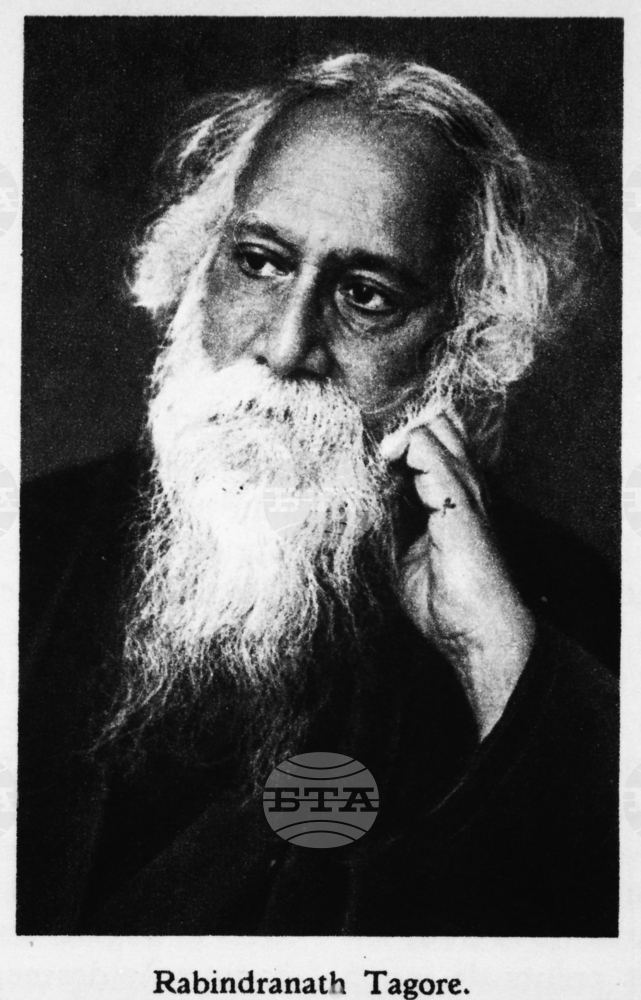site.btaRabindranath Tagore in Sofia: “Now I Feel Like a Real Bulgarian!”


On November 17 of 1926, Indian poet and philosopher Rabindranath Tagore delivered a lecture on “Modern Culture” in Sofia's Free Theater. Contemporaries have preserved the memory of an extremely warm welcome and extraordinary attention to the guest. At the send-off, in the square in front of the railway station, Tagore exclaimed: “Now I already feel like a real Bulgarian!”
***
Rabindranath Tagore (1861–1941) is one of the remarkable personalities of his time. Winner of the Nobel Prize for Literature in 1913, poet, musician, artist, public figure and philosopher, he left a lasting mark on world culture (the national anthems of India and Bangladesh are based on his verses). Tagore’s visit to Bulgaria in November 1926 was part of his tour in several European countries. The interest of Bulgarian society in his visit was exceptional.
In Sofia, Rabindranath Tagore was welcomed by nearly ten thousand people, and his visit was the leading news in all newspapers. (The same thing happened in Ruse.) Tagore's lecture in Sofia on November 17 was widely covered in the media and remains in the memory of many contemporaries. According to the then 28-year-old Konstantin Katsarov (future professor in law at the University of Sofia and associate professor at the University of Geneva), “We all loudly and respectfully acclaimed him, as if God himself had come down to earth. And his figure, clothing, and long hermit-like beard predisposed us for such a perception.” (“Sto godini zhiviana istoria“ [A Hundred Years of Lived History]).
The lecture was opened by Dimo Kazasov, a journalist (and politician with a complex and controversial career). Later Kazasov recollects (in “Sledi ot minali dni” [Traces of Days Gone By]):
"A public meeting was held in the “Svoboden teatar [Free Theater]” (today's Musical Theater on Vasil Levski Street) with a rather high entrance fee. All tickets were snatched up and visitors could barely make their way through the crowd blocking the street in front of the theater. When Rabindranath Tagore appeared on stage, the flimsy theater’ hall shook with stormy and lasting ovation. (…)
In his speech, Rabindranath Tagore said: “I have traveled all over Europe, from the north of Sweden to your south and have seen much. I try to guess the secret that has gathered you here and I come to the conclusion that you are a young people, with a simple soul, who have not yet been corrupted by Western civilization. I have been in countries where the physical and the material are valued, I have seen the circus of brute force. And you are a young people who want to join the spiritual. You are a people who believe in the ideals of the future. I do not come to you as a poet and philosopher, but, as a poet, I want to tell you that I am your man, because the poet sings about the love he feels, the love that I feel your souls overflow with. I come here to emphasize something which will revive humanity - and which I fully serve - Love among peoples."
The interest in Tagore’s visit, in his life and words, could seem rather unusual (both now and a century ago). He came from a distant country, about which little was known in Bulgaria. Bilateral relations were absent, for India was not an independent state. Tagore was a complete stranger to Bulgarian history and social life, he communicated through an interpreter from English, his works were known, but not extremely popular in Bulgaria.
However, the interest in his visit was extraordinary. Part of the explanation for this interest could be found in the specific atmosphere of Bulgarian society, which had just witnessed two national catastrophes (one after the Second Balkan War and another, after the First World War). The country had suffered many casualties in the wars; it was flooded with refugees from the lost territories; the economy was recovering with painful difficulty; defeated Bulgaria was paying reparations, the social unrest of 1923 left a heavy mark on the national psyche... Public sentiment was looking for something to cling to – following the bitter experience of the past decade: an all-national cause, a reference point, a direction for societal development, an example to follow, a formula for group existence - after the failure of the ideal of national unification in bloody wars…
Tagore brought to this society a non-political message: that love between people and between nations will replace brute force and will save the world.
Here is how prof. Asen Zlatarov (1885-1936; a Bulgarian biochemist, writer, social activist) describes his impressions of the famous guest’s stay in Bulgaria: “Tagore has left. But his image will remain imprinted in our souls for a long time. Sofia experienced two days of spiritual celebration: we have not had such a stir in all societal circles for years. At least our hearts are fertilized for reaching for something higher than everyday vanities, hatreds and evils. When the people enthusiastically welcomed the poet with chrysanthemums in the streets, no one stopped to look at the city walls, still stained with the hatred of the election appeals... Wisdom and beauty were our guests and made us remember that we are human.”
/NF/
news.modal.header
news.modal.text